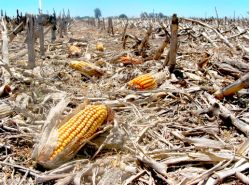Today Novozymes, a leader in the development and production of enzymes used in the ethanol process, and Royal Nedalco, a leading developer of yeast as well as an ethanol producer, have announced a collaborative project to develop a new fermentation process that can efficiently ferment C5 and C6 sugars. Fermentation of both of these types of sugars is essential for the commercialization of cellulosic ethanol.
“Novozymes is first and foremost an enzyme provider, but we wish to be a valuable partner for the biofuel industry,” said Claus Fuglsang, Senior Director for Bioenergy R&D at Novozymes. ”By contributing our fermentation insight to this partnership we help producers of cellulosic biofuel increase their yields. This will benefit the entire industry and eventually also Novozymes.”
 Biofuels made from agricultural waste such as wheat straw and corn stover is quickly approaching commercialization, but improvements in the production steps are still needed to more efficiently and cost competitively bring the fuel to market. As explained by Novozymes, when producing cellulosic ethanol, enzymes convert cellulose and hemicellulose in agricultural waste to sugars which are then fermented into ethanol. To achieve optimal yields, it is essential to ferment not only the easily fermentable C6 sugars (glucose) but also the more difficult sugars (xylose and arabinose). Consequently, Novozymes and Royal Nedalco are working together to develop this more efficient process.
Biofuels made from agricultural waste such as wheat straw and corn stover is quickly approaching commercialization, but improvements in the production steps are still needed to more efficiently and cost competitively bring the fuel to market. As explained by Novozymes, when producing cellulosic ethanol, enzymes convert cellulose and hemicellulose in agricultural waste to sugars which are then fermented into ethanol. To achieve optimal yields, it is essential to ferment not only the easily fermentable C6 sugars (glucose) but also the more difficult sugars (xylose and arabinose). Consequently, Novozymes and Royal Nedalco are working together to develop this more efficient process.
In a company statement, Ger Bemer, CEO of Royal Nedalco, stated, “Nedalco has successfully addressed the challenges of C5 sugar fermentation. This partnership will aim to widen and speed up the commercial availability of C5 fermentation technology to cellulosic biofuel producers all over the world.”
Under the terms of a Joint Development Agreement, Royal Nedalco will develop different strains of C5 yeast which will then be tested by the partners. After final development, Royal Nedalco will market the most efficient yeast strain to producers of cellulosic ethanol.

